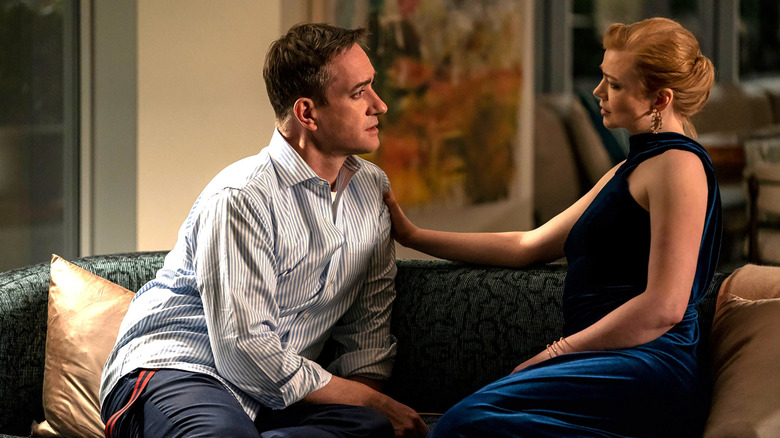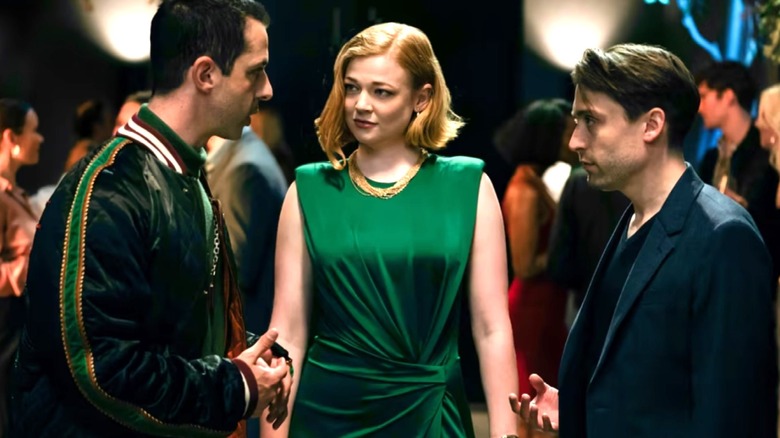Black Mirror's Saddest Episode Was Written By The Creator Of A Beloved HBO Series
Although "Succession" is well-known for its skewering of the 1%, its actual claim to fame is its ability to portray relationships that are both absurdly toxic and completely believable. Shiv and Tom were a total mess, but the disaster of their relationship wouldn't hurt so much if there wasn't some genuine love between them. The audience can understand why Shiv and Tom are bad together, but there's just enough there for the audience (or at least, some of the audience) to root for them anyway.
That's why it's not too surprising to learn that "Succession" showrunner Jesse Armstrong also wrote an episode for the British dystopian anthology series "Black Mirror," way back in its first season in 2011. The episode was "The Entire History of You," a critically acclaimed story that serves as perhaps the best example of what a typical "Black Mirror" episode should look like. A "Black Mirror" episode should introduce a cool bit of sci-fi technology — in this case, a memory implant that lets people record and revisit everything they see and hear. Then it should show us all the fun little ways this tech impacts the world, and then it should show us how it makes things worse.
Here, the downside is that Liam (Toby Kebbell) starts obsessively replaying moments from his life in an attempt to prove his wife is cheating on him. If it wasn't for the tech, he could've let it all go, but now he has the means to go down this rabbit hole at the expense of his marriage and mental health. Liam grows increasingly paranoid and obsessive, only for the show to hit us with that brutal "Black Mirror" twist: Liam's suspicions are correct. Not only did his wife Ffion (Jodie Whittaker) cheat on him, but their baby isn't even his. And so ends one of the messiest, darkest, saddest episodes in "Black Mirror." It's the only episode I haven't rewatched, because I find it too depressing and uncomfortable to return to.
The many similarities between The Entire History of You and Succession
"Succession" fans have often looked back at "The Entire History of You" for any signs of "Succession" lurking in the writer's mind. The most obvious element to point out is the episode's fairly nuanced take on infidelity; Ffion has cheated on Liam, sure, but she's not portrayed as a villain nor does Liam find any happiness in exposing her. Something similar would play out in "Succession," where Shiv would not only cheat on Tom but would ask him for an open relationship on their wedding night. (Classic Shiv!)
It's another messy, uncomfortable situation, and "Succession" doesn't allow Tom to be a clear-cut victim. We see from his treatment of those beneath him (like that employee he uses as a footrest) that he'd probably treat Shiv even worse if the shoe was on the other foot. If Tom was the rich heir to a multi-billionaire CEO and Shiv was the one of much lower means, it's easy to see Tom taking her for granted too.
Another fun similarity is the way "The Entire History of You" portrays the corruption of tech in the same way "Succession" portrays the corruption of money. For the former episode, one of the most disturbing sequences is a sex scene between Liam and Ffion, where instead of enjoying each other in the moment, they're having sex while watching memories of their previous sexual encounters. It's a haunting sequence; the memory technology was supposed to bring people closer, but we can see here how much it's killed the intimacy between them.
Meanwhile in "Succession," Shiv and Tom quickly reach a point where they can barely talk to each other outside of polite, corporate pleasantries. They talk about their marriage like it's a business arrangement, which it basically is; it's not until their big season 4 fight that they can speak directly. That scene was brutal, but it was a net positive for the two — their wealth had given them the luxury of going nearly four seasons without an honest conversation. It's only afterwards that they could truly begin to patch things up. (At least, that's my interpretation.)
Jesse Armstrong prioritizes character over concept
The main similarity between "The Entire History of You" and "Succession" is the way both stories avoid taking the easy route. For the "Black Mirror" episode, the easy route would've been to have Liam's suspicions turn out to be unfounded. If his suspicions had been entirely paranoid, it would've served as a much clearer critique of the memory tech on display here, but it also would've been a lot less interesting.
The episode sticks in viewers' minds for so long because the tragedy can't fully be blamed on the tech, and because the characters are so complicated and well-written that they can't be reduced to simple allegories. The show's typical expected satire is there, but it takes a backseat to the compelling drama. It's a big contrast to some of the more disappointing "Black Mirror" entries over the years. The latest season's "Common People," for instance, is a damning critique of for-profit healthcare, but that's all it is. The characters exist to serve the message the episode's making, but they aren't complex characters in their own right.
Likewise, "Succession" could've easily have been a standard "eat the rich" narrative, but it never settled for something so simple. There are no working class characters for us to root for (no, Greg doesn't count), and the main conflicts are almost entirely interpersonal. The anti-1% themes are still there of course, but they take back seat to making sure these characters are complex and compelling. We can't just put them into one box, no matter how hard we may try. It's easy to make the audience sneer at your rich main characters, but it's far more impressive to make your viewers both hate and root for them at the same time.


